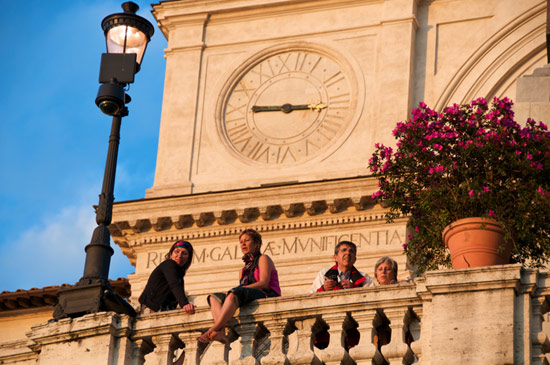Culture and Society: Time Orientation
Perception of Time
Largely stemming from their Roman Catholic traditions, Italians perceive time as linear, beginning with a moment of creation in the past and progressing toward a final judgment in a future afterlife. Modern Italian society, however, encompasses more divergent views of the existence or nature of an afterlife based on a variety of religious beliefs as well as agnosticism and atheism.
A society firmly grounded on tradition and family, Italians have a short-term orientation to the future, evident in their respect for tradition and their value of leisure time and personal stability.
Traditional Calendar
Italians use the solar-based Gregorian calendar, introduced by Pope Gregory XIII in 1582 to better accommodate the timing of Roman Catholic holidays. This calendar centers around the nativity of Jesus Christ, using a system in which each successive year before and after this event is numbered in ascending order. The years prior to the nativity are followed by a.C. (ante Cristo, or Before Christ), and those after the nativity by d.C. (dopo Cristo, or A.D. for Anno Domini, meaning "In the year of our Lord"). Both continuums begin with the number one; there is no year zero.
In Italy, the calendar year is propelled by the Christian liturgical calendar and Saints’ Days, as well as by national holidays. Each city has its own Saint’s Day, which is celebrated as a regional holiday; each Italian is also accorded a personal Saint's Day. Italians from more traditional backgrounds often celebrate their Saint’s Day in addition to their birthday.
Attitude Toward Time
Llike many countries of southern Europe, Italy generally has a more flexible approach to time than its European neighbors to the north. A largely polychronic culture, Italians use time to meet people's needs rather than to accomplish tasks. As a result, tasks and timeliness are prioritized by the importance of one's relationships than by an agenda. Breaks and personal time, especially meals, are held sacrosanct. Dinners often last several hours, and are held in high regard as personal time in which to relax with one’s friends and family.
However, the Italians’ reputation for putting family first and having a relaxed, leisurely lifestyle is, while especially true in southern regions, less prevalent in the north, which relies on industry rather than agriculture for its wealth. Even in the north, however, a dichotomy exists between the importance of punctuality in business and the more leisurely pace of public life and public transportation. As a general rule, the farther south one travels in Italy, the more time is treated as the servant of man rather than his master.
Social Engagements
Italians are flexible about time when meeting for social engagements, but it is important not to keep someone waiting too long, as this may be perceived as disregard for the relationship. That said, it is not typically regarded as impolite to keep a friend waiting for up to 15 minutes. For an invitation to someone’s home, an arrival within 15 minutes of the scheduled time is generally acceptable, as is arriving shortly after the arranged time for a meal invitation at a restaurant. Likewise, it is not uncommon for Italians to arrive up to 30 minutes after the start of a party without causing offense.
Business Engagements
Italian business meetings, unlike social engagements, adhere more strictly to their stated times, especially in the north where a dependence on manufacturing has led to a respect for punctuality. However, agendas may not be meticulously followed. Deadlines are expected to be met and responses to queries prompt, especially in northern Italy, where adherence to the adage, "Time is money," is the norm. Delays in meeting times are more frequent the farther south one travels, where this philosophy is not as strictly observed. It is common for businesspeople to bring projects to work on in case they are kept waiting for a meeting. Meetings with government officials or functionaries typically adhere less strictly to scheduled times than do private business meetings.
Northern Italians typically get down to business fairly quickly, while their southern counterparts often prefer to chat first to establish a relationship. Two- or sometimes three-hour lunch breaks are common, and because of this, many businesses, especially in the southern regions where people wish to avoid the heat of the day, are often open late into the evening. Production and service deadlines are usually met, especially in northern Italy.
Article written for World Trade Press by Heather Thielen.
Copyright © 1993—2024 World Trade Press. All rights reserved.

 Italy
Italy 
